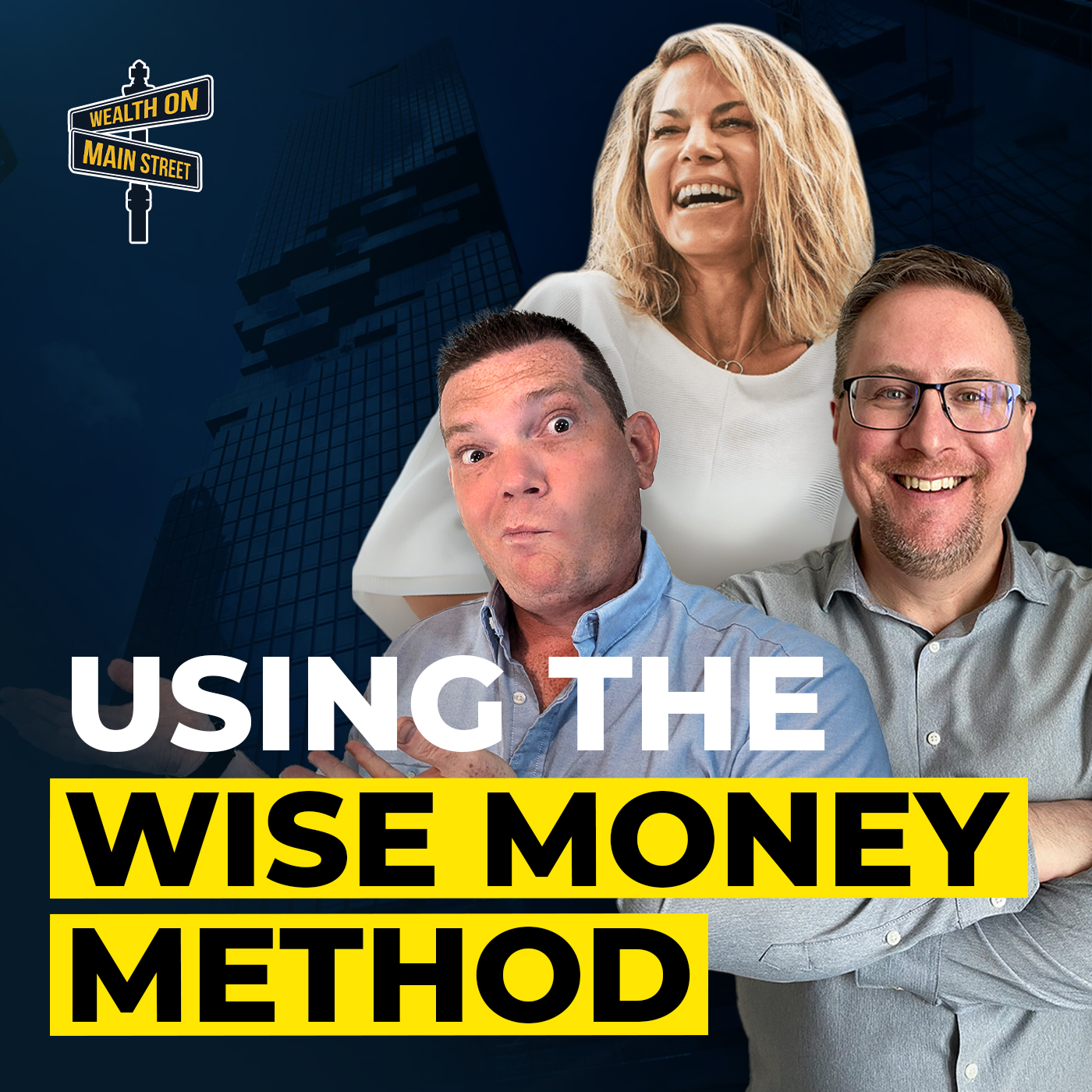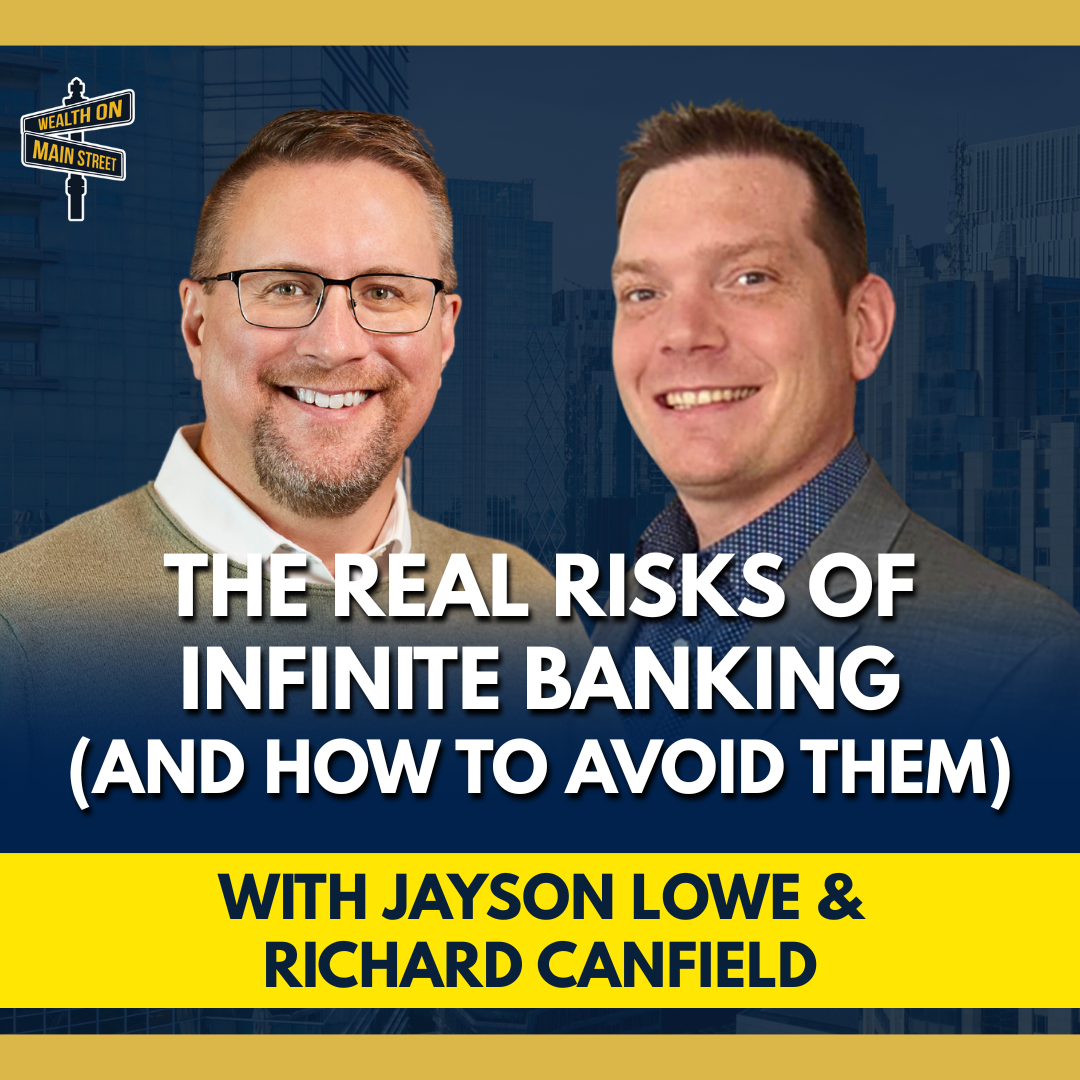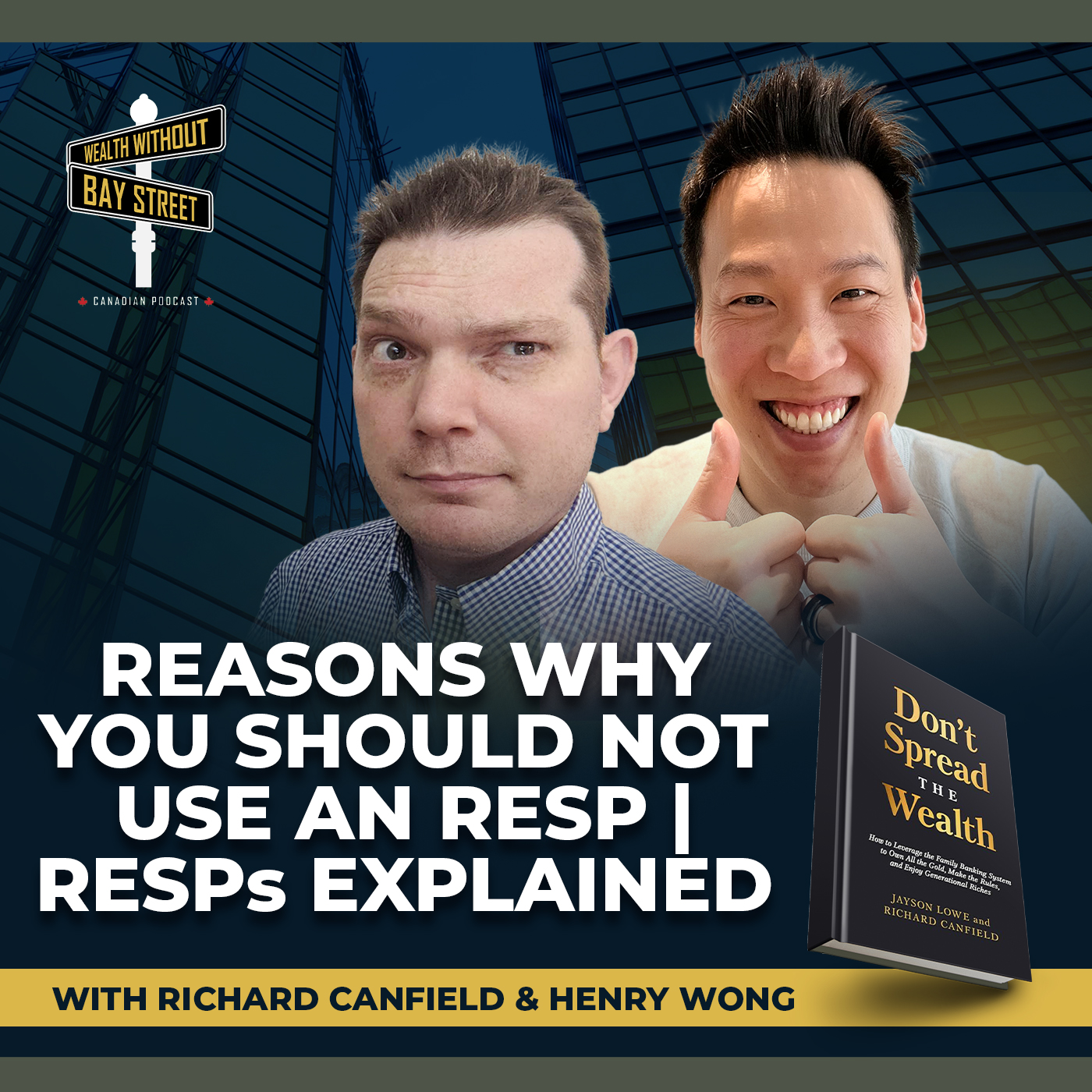Episode Transcript
[00:00:00] Speaker A: You were listening to the wealth without Bay street podcast, a canadian guide to building dependable wealth. Join your hosts, Richard Canfield and Jason Lowe, as they unlock the secrets to creating financial peace of mind in an uncertain world. Discover the strategies and mindsets to a financial future that you can bank on.
[00:00:22] Speaker B: Get our simple seven step guide to becoming your own banker. It's easy. Head over to Sevensteps CA and learn exactly the learning process required for you to implement this amazing strategy into your financial life. That's Sevensteps ca.
[00:00:39] Speaker C: Finding the money.
Finding the money.
You earn money. You spend it, you earn it, you spend it. That's the cycle you decide that you want to implement this process and you're thinking about, where do I find the money to get started?
[00:00:58] Speaker D: And if you have a picture of a Sherlock Holmes hat and holding a magnifying glass like you're running through your house looking for where all the money is, that's not what we're talking about. No, there's no treasure hunt required.
[00:01:12] Speaker C: As we indicated in the chapter, we learned a lot from Nelson, and one of the most fundamental things that he taught us is that you're already allocating 100% of your financial resources to wherever you believe it's most important. And so you've only got so much capital that you're handling, and you take that capital and you're allocating it to all the things that you've prioritized as being important.
And so once the implementation of this process becomes important, it requires a reallocation.
So you've got to look at where the money is flowing to presently and how much of that financial energy money you want flowing in to your system to get started.
And any great coach will help you do that. Versus it's not a I either have money available or I don't. There's more of an expanded conversation to say, why don't you take a closer look at where you've prioritized the allocation of 100% of your financial resources presently, you've indicated the implementation of this is very important. And so let's go through a process of finding the money to get started.
[00:02:36] Speaker D: And what's interesting about it is, as coaches who practice doing this, and even Nelson says that talks about on page 65 of his book, that one of the reasons he wants you to work with a coach who is well trained and has, whether it's questionnaires or a way of visually seeing your money to be able to ask you questions about it so that you can see it differently, that's part of what coaching is all about. So, again, sometimes we don't recognize that we've prioritized the money to go do one thing, because we're so habitually conditioned to do that that you need to get a chance to lift your head up and get a different view of what's going on. So we talk about kind of in the book, dumping the financial junk drawer. Now, as a listener, you're probably picturing what your junk drawer looks like right now. And you got a shutter right down your spine, because, like, oh, my God, I don't want to open that. Oh, please, no, let's not go in there. But everyone's got a junk drawer somewhere. Like, there's elastics and deck of cards and ziploc bags and random things that your kids leave around all sitting in there. You've got that going on in your financial life, and I haven't yet met anyone who hasn't had that be the case, myself included. So you have to reevaluate these things from time to time. We all need the outside perspective of someone who is detached from our day to day operation, and that's what a coach will help you do, because we can see things that often other people can't see. And it's not that we have any magic trick or some.
It's just like a trained thing that you build up over time. It's like any muscle. And when you spend your day in and out of meeting with people, learning how money is flowing through their life, there are certain consistent themes that you can see and spot in a harpy. It's like, oh, boom. Hey, there's ten grand. There's six grand. There's $200 a month. There's this. There's that. There's this. Hey, tell me more about that. Tell me more about your tax refund. Tell me more about your bonus from work. Tell me more about this.
You can ask questions to get people to think about what they've been doing with that money. And one of the things we mentioned in the book is just take a moment and think. Even hit the pause if you need to. Just stop and think about this. Where have there been times in your life when you've had random amounts of money show up?
Maybe you sold some stuff on Kijiji or on Facebook Marketplace. It was a tax refund. It was some birthday gifts that were unexpected, where you got $500, like, things that showed up that were unexpected, random amounts of money.
Now stop and think.
Where's all the money?
Where did it go?
[00:05:23] Speaker C: Your expenses rose to consume.
[00:05:26] Speaker D: It you found a way for that money to be prioritized somewhere in your life without actually putting it into an area, most likely that would have created any financial benefit that outlives you. What do I mean by that? I mean a financial benefit that you can utilize through your life and still leave behind to the people or the things that you love.
[00:05:49] Speaker C: Absolutely.
[00:05:50] Speaker D: Which can only be done, by the way, through the method and the tool of insurance, when structured appropriately, that'll actually be there and has permanency. So that is fundamentally a new question that needs to get drilled into most people's heads because we're not trained and taught to think about that question. We're not trained to think about these little incremental pieces of monetary value that show up at random and then how to allocate or appropriate them. Nelson, in his wisdom, teaches us fundamental human conditions that once you understand them and you begin to reflect on how they show up in your life, which, by the way, is thinking about your thinking.
Another word to describe that is to ruminate. Then you can start to spot these items. And if you think about where they've happened in the past and you get aware of that, you have a much better idea to see it now when it happens in the future so that you can attack that and do something different than what you've done in the know. The definition of insanity, I believe, is.
[00:06:57] Speaker C: Doing the same thing over and over.
[00:06:58] Speaker D: And again and expecting a different know. That's an Einstein definition, or whoever it is that said that. But that's been happening in your financial life. So implementing some new behaviors that are conducive to the goals and the objectives that you want to accomplish just by default should enhance your overall financial condition.
[00:07:21] Speaker E: Become your own banker and take back control over your financial life. Hey, is this even possible? You may be asking, can I even do this? Well, you better believe it. In fact, it's easy to get going. So easy that we put together a free report. Seven simple steps to becoming your own banker. Download it right now. Go to Sevensteps ca. That's seven steps. Ca. Now let's get back to the episode.
[00:07:50] Speaker C: I'll read something that really struck me as so relevant. And this is from the late John Savage. He was, in our industry, one of the greats, just an amazing human being. And he wrote, success or failure of a savings account has nothing to do with the interest.
It never has and never will.
The success is determined by your deposits.
It is determined by a systematic methodology of putting money in and keeping it there.
Most savings accounts go up and down. But the fact remains that 90% of our society has little money saved anywhere.
Goes back to our discussion from earlier. You're going to prioritize 100% of your existing financial resources to go somewhere.
The success or the failure of your policy has absolutely nothing to do with the internal rate of return and all these other metrics that people can latch onto.
How does money end up in a savings account?
Depositor prioritized putting money there. How does money end up in a policy?
A policy owner prioritized putting money there.
And so it depends entirely on the deposits.
In this case, what we're describing are premium payments, money going in and staying there.
And so, again, when you're structuring this and thinking, where can I find the money to get started?
It's going to require a reallocation.
And that's something that a great coach can help you with.
[00:09:56] Speaker D: And we actually have an example in the book, in this chapter about a reallocation. It's a client of mine based at Edmonton, wonderful family, and how they'd had some change in their financial life, and we reallocated how they were moving money around and just by changing things, like how they were making their mortgage payment, how they were voluntarily sending money and prioritizing it to go to an RSP, into an RESP, into these different areas, by tweaking and moving all those monies around in a different way and changing the way they wanted to allocate what they were already doing. They weren't working any harder. We just changed the way the money flowed. Over $60,000 was able to be shifted in their family's life to find its way into premium. Now, a portion of that would be the minimum amount. Of course, there's a flexible portion there, so they have options and flexibility. We got four members of the family covered, one through a corporation. And we have an example of them being able to not only create insurance coverage that didn't exist before, so the family is far better protected, which they actually needed to have happen, but they're also in a position where they could create a very healthy retirement income of around $90,000 a year for a fairly extended period of time, leave a cascading death benefit to their two children, and then have the two children be able to take a passive income off of the plans that mum and dad started, and then also leave a death benefit behind to a third generation that doesn't even live yet. Sounds like it won't be born for another 15 or so years or what have you. And that's the power of thinking beyond your own lifespan, as well as the power of getting clear on what reorganization or reprioritization of your financial resources could look like. They had the desire that they wanted to do it. They spent the time doing the education, reading Nelson's book, watching Nelson's documentary film, going through our educational content, listening to podcasts, et cetera, to be able to make a decision that this was something that they wanted to prioritize as important in their life. And they can create all of these outcomes from that decision.
[00:12:18] Speaker C: Brilliant. And so let's help you find the money. Get started.
[00:12:24] Speaker D: I don't know too many people who are upset about the idea of multigenerational financial planning that gives you the maximum amount of control to do the most amount of things you want to do in your life that you're already doing.
[00:12:38] Speaker C: Yeah, and the only loser in this scenario is the government.
[00:12:43] Speaker D: Oh, darn, I'm going to shed a tear over that one, jay okay, well.
[00:12:49] Speaker C: On that note, that was a great summary. Chapter three if you haven't read the book yet, you have an opportunity. Just head on over to cashfollows.com. Again, that's cashfollows.com. Get a copy for yourself and for someone who you think would benefit from the gift of what we do and continue your journey of learning. The next video that's popped up is there for you to click on and to continue growing and learning. Thanks again for watching this summary and.
[00:13:19] Speaker D: On to the next chapter.
[00:13:22] Speaker B: Thanks for listening to the wealth without Base street podcast where your wealth matters. Be sure to check out our social media channels for more great content. Hit subscribe on your favorite podcast player and be sure to rate the show. We definitely appreciate it. And don't forget to share this episode with someone you care about. Join us on the next episode where we continue to uncover the financial tools, strategies, and the mindset that maximize your wealth.


